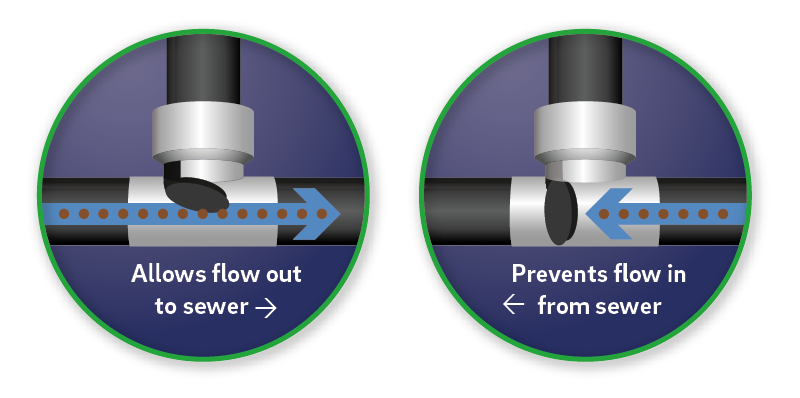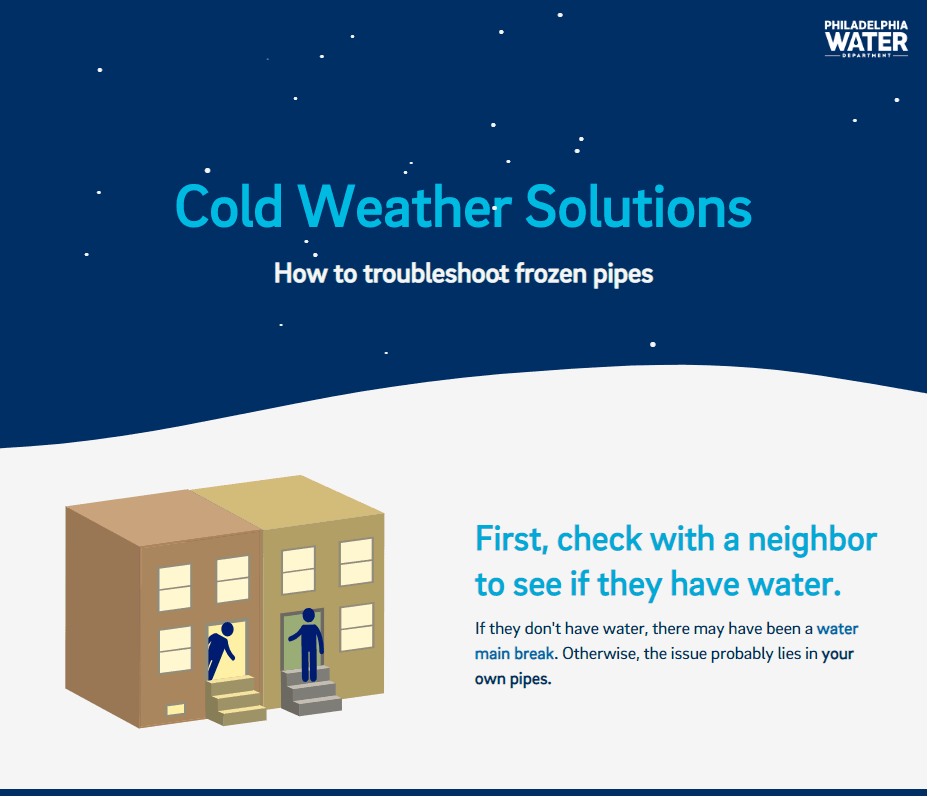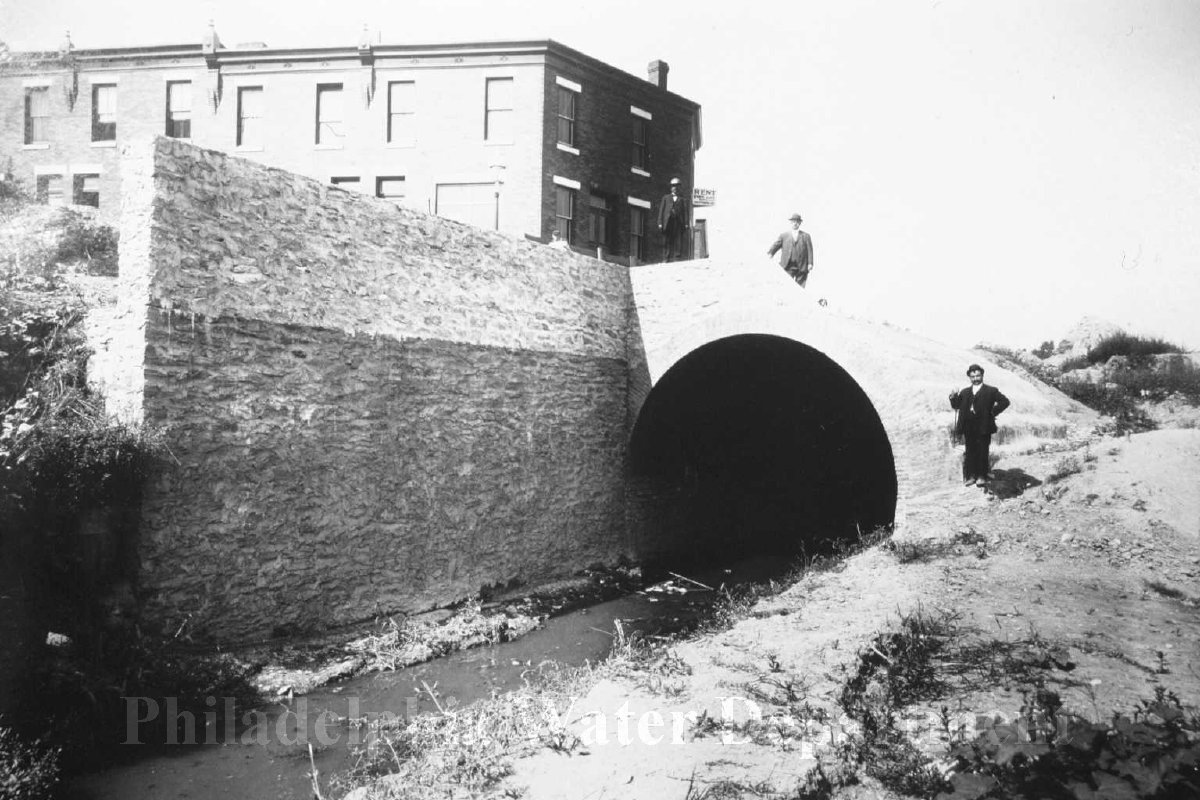If you’ve experienced a backup, you know it can be a shocking ordeal: water suddenly gushing from a floor drain, toilet, or other basement plumbing.
Unlike the many other causes of basement flooding, backups result from heavy rain causing local sewers to become so overwhelmed that water has nowhere to go but through your home’s basement or ground-level plumbing.
Areas Most Hit By Basement Backups:
- Backups occur in areas served by the City’s older combined sewer system, which carries both runoff from storms and wastewater from homes.
- Low-lying areas of Germantown, Kensington, Northern Liberties, Center City, South Philadelphia, and Port Richmond are the most impacted.
- Check this map to see if you live in the combined sewer area.
The good news: Philadelphia residents may qualify for the Philadelphia Water Department Basement Backup Protection Program (BPP), which provides free installation of plumbing devices called backwater valves that can reduce backups. Some properties may also get downspout modifications at no cost.
Here’s what to do if you think you have a backup problem:
- Document flooding: If you’re reading this because you think you just experienced a basement backup, call our hotline right away at (215) 685-6300 while you still have water in your basement.
- We will send an inspector out to take a sample of the water to determine if it’s coming from the City’s sewer.
- Having water sampling is not required to apply for help, but calling to report flooding helps us document the issue and determine if the incident is connected to a storm.
- If possible, safely use your phone to shoot videos or pictures while the flooding is taking place. Share these with the PWD inspector assigned by our contact center.
- Apply for help: Complete the Basement Protection Program application form. You can mail the form to the address provided or email it to waterinfo@phila.gov
The Fix:
Backflow devices are essentially one-way doors installed in the pipe connecting homes to sewers, usually under a sidewalk (see a diagram), and only allow wastewater to flow out into the sewer system.
Downspout modifications may also be needed if the water from your roof’s gutter is flowing through your sewer pipe—see the “Main House Drain” (labeled “I”)—and backing up into your home instead of going out to the sewer. In this case, we’ll help you direct that water to a green area like a lawn or somewhere that it can drain without causing issues.
Our Basement Backup Protection Program can pay for either (or both) of these plumbing improvements for residents who qualify!
Does My Home Qualify for BBPP?
- Your property’s water bill must be current. If you are behind on your bill, you can still qualify by paying in full or entering a payment agreement. Any previous violations issued by PWD or other City agencies must be addressed prior to participating.
- We must be able to access the plumbing where the backwater valve will be installed. This can be an issue in finished basements where drywall or other improvements may have blocked off the plumbing. But this is rarely an issue because most BBPP fixes take place at the sidewalk or downspout outside.
- The pipe connecting your home to the sewer must be in good condition. If it is broken or leaking, you can apply to have it fixed with a zero-interest loan through the Homeowner Emergency Loan Program (HELP) or hire a plumber on your own. A backflow device can be installed as part of this work.
Learn more and get the application
What to Expect If You Qualify
After we get an application and confirm that you qualify for the Basement Backup Protection Program, we’ll inspect your property and provide a proposal of the scope of work and a Basement Backup Prevention Agreement.
You’ll sign that agreement to confirm that PWD will pay for all work related to the installation, and you will be responsible for ongoing maintenance on any backflow valves or other plumbing we install on your property.
We’ll work with licensed contractors to complete the work at no charge to you, and give you instructions for how to maintain your new device.
The installation includes a one-year warranty, so we will offer free repairs within the first year after installation if any issues pop up, but you’re responsible for regular maintenance and any repairs after one year.
When needed, repairs can often be done by residents with a few tools that can be found at your local hardware store and do not require licensed plumbers.
Extra: Flooding Tips for Everyone
Whether your home is prone to backup or not, these tips can help you avoid costly damage and stay safe during flooding.
- Keep stuff off the floor. Avoid storing valuable possessions such as irreplaceable photo albums, art and important papers in your basement.
- Be ready. Visit the Office of Emergency Management’s website to ensure you’re ready for any emergency.
- Flood insurance is strongly recommended. Most regular home insurance policies don’t cover water damage in the basement. You can go to the Federal Emergency Management Agency’s FloodSmart website to determine insurance costs to your property and how to obtain flood insurance. Because the City of Philadelphia is compliant with the National Flood Insurance Program requirements, homeowners are able to purchase a FEMA flood insurance policy that would cover any future flooding. Most regular home insurance policies don’t cover water damage in the basement.
- Know your problem. There are many things that can cause basement flooding other than basement backups, including poor drainage around homes that can cause water to seep through walls.
While the Basement Protection Program won’t help with this common source of water in basements, there are other home fixes that can help. See common problem areas and fixes that can help in Chapter 5 of the City’s flood guide for residents.



